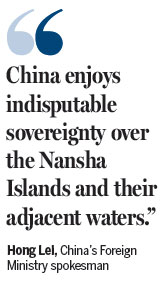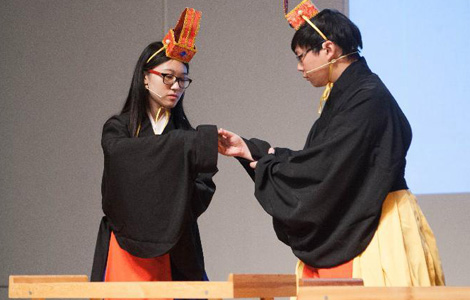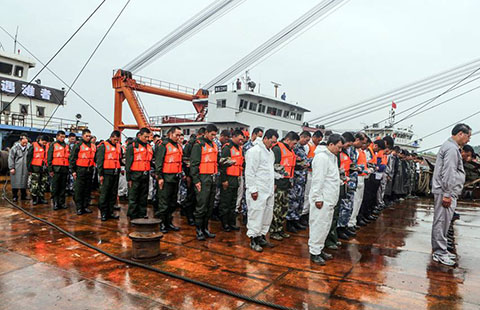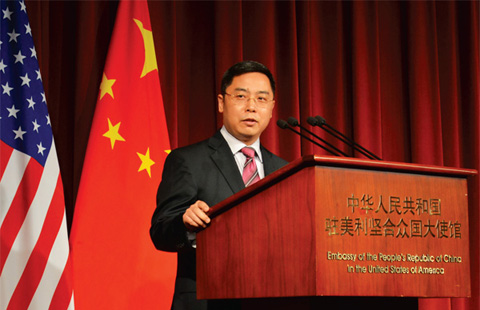China blasts Japan's move on agenda at G7 summit
Updated: 2015-06-09 07:29
By Chen Mengwei(China Daily)
|
|||||||||
Beijing said "no other country has the right to interfere" in the South China Sea, responding to Japan's stated intention to put discussion of the issue on the G7 summit's agenda.
Japanese Prime Minister Shinzo Abe proposed putting the subject on the agenda of the two-day summit in southern Germany that ended Monday with the hope of creating a joint announcement to influence China's moves within its territory.
"China enjoys indisputable sovereignty over the Nansha Islands and their adjacent waters. It is within the scope of China's sovereignty for China to build things on some of the Nansha Islands and reefs. No other country has the right to interfere," said Hong Lei, spokesman of China's Foreign Ministry, at a daily news conference on Monday.
Zhou Yongsheng, a professor of Japan studies at China Foreign Affairs University, saw Japan's move as part of an overall strategy to suppress China and gain advantage over the East China Sea.
"By investing very limited resources in the South China Sea, Japan is trying to create more tension and turbulence in this region," Zhou said. "That way, China will be distracted and won't be able to concentrate on competing with Japan in the East China Sea. It's all for their own wishful thinking."

Luo Yongkun, a researcher of Southeast Asian studies at the China Institutes of Contemporary International Relations, said Japan's move at the summit will have little direct influence on those parties affected by the situation in the South China Sea.
"Japan itself is hardly related to the region in any sense," Luo said. "But the trick here is, by doing diplomatic things like this, Japan has repeatedly tried to depict China as a 'destabilizer', creating a public delusion as if China has made the South China Sea unstable, which is contrary to the reality."
Wang Ping, a researcher of Japan studies at the Chinese Academy of Social Sciences, said that as much as Japan wanted to take advantage of the summit as an international platform to restrain China, the other members may not buy it.
"The situation in the South China Sea does not really matter much to many of the G7 members. Japan can speak up, and as a political trade-off, the others might take some time to listen," Wang said. "But that doesn't mean when Japan kicks the ball, the rest will obediently catch it. They know how important their relations with China are. No one is stupid."
Of the G7 members, Britain, France, Germany and Italy have signed up as prospective founding members of the Asian Infrastructure Investment Bank, a Beijing-led initiative, while the US and Japan have declined to take part. Canadian media have reported that Ottawa is considering applying for AIIB membership.
chenmengwei@chinadaily.com.cn
(China Daily 06/09/2015 page3)

 National college entrance exam ends in most parts of China
National college entrance exam ends in most parts of China
 Peking University opens Chinese traditional art courses
Peking University opens Chinese traditional art courses
 Rescuers mourn victims on seventh day since Eastern Star disaster
Rescuers mourn victims on seventh day since Eastern Star disaster
 Rescuers enter Eastern Star hull in search efforts
Rescuers enter Eastern Star hull in search efforts
 Gaokao held across China
Gaokao held across China
 Man sues actress for staring at him
Man sues actress for staring at him
 Students prepare to take national college entrance exams
Students prepare to take national college entrance exams
 Across America (May 29- June 4)
Across America (May 29- June 4)
Most Viewed
Editor's Picks

|

|

|

|

|

|
Today's Top News
China gives its yuan to Broadway
Questions remain unresolved in the cruise ship disaster
Escaped New York prisoners may have had help from staff
Memphis hospital adds new China affiliate
Police alerted over forbidden photo shoot
Heavyweight Zhang wins unanimous decision
China mourns Yangtze shipwreck victims as search continues
China signs $50m agreement with FAO to support developing countries
US Weekly

|

|







